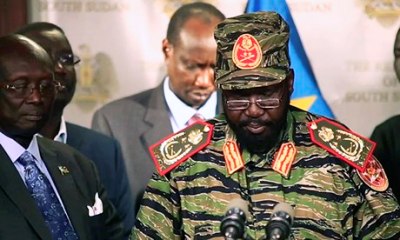S. Sudan’s Kiir urges unity within armed forces
March 4, 2014 (JUBA)- South Sudan president Salva Kiir says unity within the armed forces was necessary for the latter to achieve the mission for which it was instituted.

The South Sudanese leader, flanked by minister of defense, Kuol Manyang Juuk and James Hoth Mai, the army’s chief of general staff, urged members of the military to maintain the regimentation and discipline of a professional force.
“You must exhibit commitment to duty and obedience to a constituted authority. I am not a leader of one tribe. I do not see myself a Dinka leader because South Sudan is a not a nation of the nation. I was elected by all the tribes,” said Kiir, also commander in-chief of the army.
“As army, you must demonstrate that you are ready to reject tribal politics and unite to defend the constitution of this country, which is the primary mandate and the mission the country had given,” he added.
Meanwhile, defense minister accused South Sudan’s ex-vice president, Riek Machar who now leads armed rebellion against Kiir’s leadership, of involvement in coup attempts even when it was uncalled for.
“This person called Riek Machar is used to staging coup attempts. He tried that in 1991 and again in 2013. He does it when he sees any positive developments for the people of South Sudan. He staged coup attempt against John Garang in 1991, when the movement was about to capture Juba and all other areas. Our forces entered Jebel Kunjur and some were at the airport, but he stabbed us at the back by dividing the force. In 2013, he saw the country going to witness coming of investors but he spoiled that by staging another failed coup attempt,” Juuk told the army officers.
“This is the person who does not want anything good for the people of this country, otherwise there is no reason to explain why he staged a coup when he sees something good going to come,” he added.
The defense minister, however, urged the army to shun tribal politics, threatening he would deal with individuals advocating for or showing tribalism in the army.
“Tribalism must not be encouraged. It must reject by all means. The army does not belong to the tribes and the presence of elements with tribal mindsets create unacceptable behavior and situation that compromises standards of morale, good order, discipline and the cohesion which are essence of the military capability,” he stressed.
But a critic of both President Kiir and his defense minister claimed the duo had conducted themselves in a way reflective of being tribal leaders, despite their calls for the army to desist from such practices.
“I watched the speech of the president on South Sudan television yesterday but all he said did not suggest any change in the style of his leadership. He was just complaining and blaming other people for his own failures as usual. This is the man who publicly admitted that he recruited a military force outside the structures of the army just to defend himself. This act itself shows that he behaves like a tribal leader”, a senior member of the governing Sudan People’s Liberation Movement (SPLM),” the renowned critic, who asked not to be identified, said.
He described defence minister Juuk as an “excellent tribalist”, citing the mass killing of the Murle tribe when he was governor of Jonglei state.
“Kuol Manyang is himself is another disgrace personality. He is an excellent tribalist. The event of 2011 and 2012 in which he allowed Murle to be killed without intervention as the governor are self-explanatory of who he is. Who do they want to fool with this rhetoric? They have not proved that what they say is not what they do,” he observed.
“These are the people who say one thing in public gathering and do completely different thing in their offices. We know them,” added the critic.
(ST)
